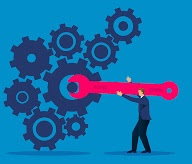Knowing your work
(Execution Excellence -"Ability to get things done" Series)
Under the Series " Execution Excellence-Ability to get things done" in a professional setup, we have discussed the importance, methodologies, and some insights on
1. Personal Leadership
2. Inspiring and influencing others
The last is "Having in-depth knowledge and awareness of the work or business."
For several reasons, having in-depth knowledge and awareness about one's work or business helps get things done efficiently.
- Informed Decision-Making: When you have a deeper understanding of your work or business, you can make more informed and well-thought-out decisions. Knowledge allows you to consider various factors, analyze potential outcomes, and choose the best action.
- Building Credibility and Trust: Expertise in your field enhances your credibility and earns the trust of colleagues, superiors, and clients. Others are more likely to rely on and support your decisions and initiatives when they see your knowledge and competence.
- High Edge on solving problems and influencing people than someone with limited knowledge about the work/ business.
For example,
An executive working for new product development in a software company with a solid technical background and knowledge of the industry can better assess the feasibility of the product, understand the market demands, and guide the development team effectively. They can provide valuable insights during the design and development phases, resulting in a product that meets customer needs and gains a competitive advantage. In contrast, an executive with limited technical knowledge might need help comprehending the project leading to delays, miscommunication, and potentially a less competitive product.
Similarly financial head in a manufacturing company with a thorough understanding of the business's financial performance can make strategic financial decisions more confidently. He/ She can identify cost-saving opportunities, evaluate investment options, and allocate resources efficiently to drive growth. In contrast, a finance head with limited financial acumen may need help to grasp the financial implications of different decisions, leading to suboptimal financial outcomes for the organization.
Similarly, consider a Human Resources (HR) executive responsible for talent acquisition and employee development in a pharmaceutical company. An HR executive who understands the specific skill sets required for various roles can hire suitable candidates and design training programs to enhance their capabilities. An HR executive with limited knowledge of the pharmaceutical industry may need help to recruit and retain the right talent.
The key point is that in-depth knowledge about own profession will help to execute fast without struggle.
Learning more about our work and our business is a continuous effort, and the more we know, the higher we have capabilities to get things done.
Have a great week ahead!






 ), if any problem happens, the momentary reaction would be, "Why this happened, and what needs to be done?". Their immediate intention would be to recognize the problem and look for a suitable process, eventually fixing the people.
), if any problem happens, the momentary reaction would be, "Why this happened, and what needs to be done?". Their immediate intention would be to recognize the problem and look for a suitable process, eventually fixing the people.



